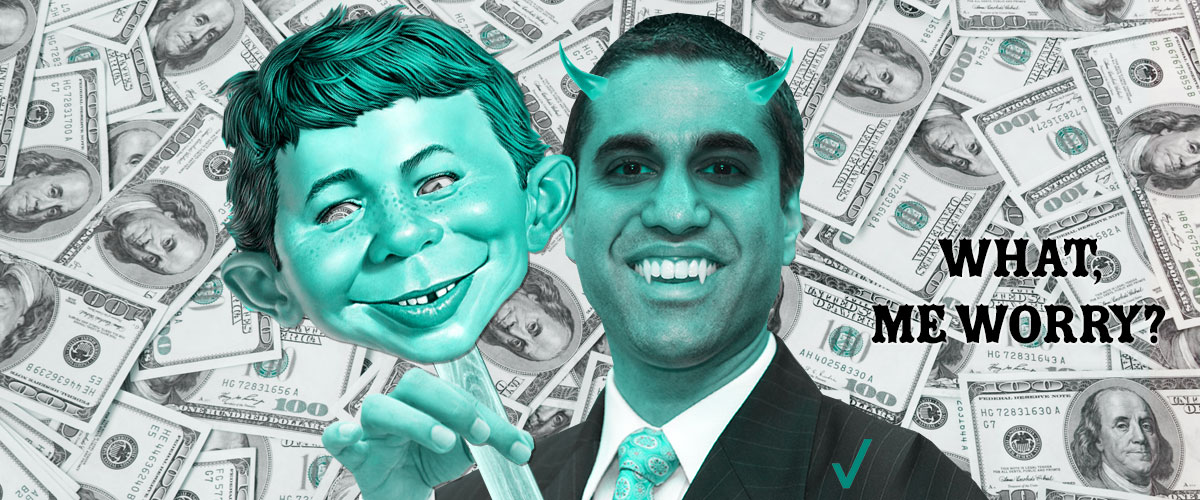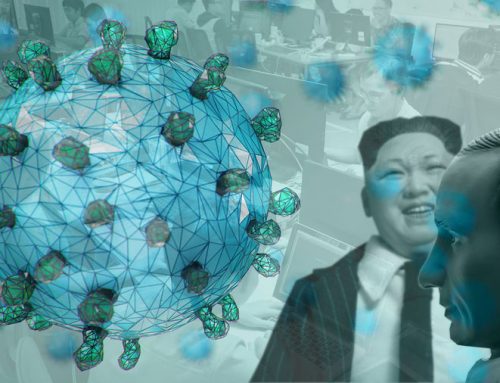Yes. Yes, we did. We just lost the internet.
SMH. It’s hard to put into words the feelings, you know?
The closest you will get is to watch the series “Deadwood.” The ISPs are Hearst. Ajit Pai is a more spineless and more pathetic version of E.B. Farnum. Commissioner Jarry is our current president of the United States. And John Oliver is Seth Bullock.
If you’ve seen the series, even if you don’t completely understand the ramifications of what we as a society have just lost, you understand the ruthlessness, the pork belly politics, and the underhandedness by which it was taken.
The Needle Returns to the Start of the Song.
When you get to the end, it’s common to look back at the start. Then follow the breadcrumbs along the way to see how it all lines up (with the benefit of 20/20 hindsight).
In this instance, you will see that net neutrality was put into place to protect us, the American people, from a growing oligarchy of companies between 2005 and 2010 that were aggressively maneuvering to control the internet.
Why? What was going on at that time? Who were the major players? Have a seat, let’s walk through this… oh, you’re already sitting, good – let’s get started.
It Was the Best of Times, it was the Worst of Times.
In the mid-to-late ‘90s the internet hit the world like a ton of bricks. Never mind that it existed for quite a while before that, but by the late ‘90s it was commercializing and becoming mainstream. Websites were popping up, people were sharing information, bottom line, “it was cute on steroids.”
But the bandwidth sucked. And it was slow. So, ISPs worked hard to get into everybody’s home with faster bandwidth because more adoption plus more bandwidth means more money.
This rapid ISP growth fueled the dot com boom. Suddenly, any crappy idea with a .com at the end was pure genius. People were dumping billions of dollars into start-ups left and right. It was a real-life version of, “It’s a Mad, Mad, Mad, Mad World.”
Some were working out great (like Amazon selling them books) and others looked unstoppable (like our friends Netscape. Who’s Netscape? Google it.)
Then things got weird, quick. Stupid, overfunded companies like Pets.com and Boo.com went down in flames. The halo effect was dragging company values like that of Cisco and Qualcomm down with them. Big companies and big investors watched with great intent to see how this would play out.
Enter the dot bomb era and everyone took a breath and the baby boomer generation said, “see, the internet was just a fad.”
Nevertheless, ISPs persisted.
Bandwidth speeds improved, people got over the fear of putting their credit card info on the internet… um, porn… and other factors continued to stoke the coals, galvanizing the internet’s place in America’s everyday life.
Then around the year 2000, the newspaper industry said, “hey, wait a minute, I thought quicksand was only in 1970 sit coms…” and by 2005, the writing was on the wall, and the entire print industry from newspapers to magazines was in critical condition. In a little more than 5 years, newspaper circulation would be cut in almost half.
That was the sonic boom. The internet was breaking the sound barrier. And it was just getting started.
ISPs were nodding and high-fiving. And began eating each other to grow larger to compete with the AT&Ts and Versions – e.g. Comcast/Xfinity, Charter/Spectrum, etc.
They knew exactly what they had done. They had invented the modern-day equivalent of the Colt 45 during the wild west. “God created men; Sam Colt made them equal.”
Meanwhile, other industries were under attack. The music and film industry were facing piracy issues like never before. Movie theaters were becoming silent as HD TVs and streaming entered homes. Things were being done now that many people thought would never happen. Cars were being bought online. Shoes were being bought online. The real estate industry was under a complete revolution.
For most of this time, ISPs had been like kids running down a hall waving their Colt 45’s shouting, “we’re invincible!” Then between 2005 and 2010 they realized, “wait a minute… this thing is loaded.”
The Rise of Whack-A-Mole
BitTorrent, Netflix, Skype, and similar rapidly-growing companies were causing unforeseen problems. Hey, Skype, you’re letting people know that you can make international calls essentially for free over the internet? What are you doing? Netflix, you killed Blockbuster! BLOCKBUSTER! (Psst… if you were born after 2000, Blockbuster was Starbuck’s before Starbucks).
Yeah, it just got real.
It was like playing whack-a-mole. Comcast blocked BitTorrent altogether, they viewed them as a threat. Verizon, AT&T, and Comcast were throttling Netflix into the grave until Netflix agreed to pay the blood money. This is a not-so-funny chart that show the important of Net Neutrality:
Note this was in 2014. During this time, FCC chairman Tom Wheeler, a former CEO and president of 2 major ISP-related organizations, was one of the people behind drafting a rule that would allow ISPs to put the screws to Disney, Google, and more to charge them up the butt if they wanted to reach their audiences. In May 2014, over 100 internet-focused companies – including Google, Microsoft, eBay, Facebook – said, this is a “grave threat to the internet.”
2015 through January 2017 was the best the internet will have ever been.
Exit Light, Enter Night.
In January 2017, Trump appointed Ajit Pai, former Verizon lawyer, to the FCC in order to take away net neutrality and galvanize an oligarchy of companies to own and control the internet.
Guised as “Restoring Internet Freedom,” Pai issued an NPRM to remove protections in place for American citizens from ISPs throttling bandwidth, overcharging for internet access, censorship, blocking of competitive services, and more.
People voiced their opinions, in droves, to the FCC back in 2014 supporting net neutrality, thanks to John Oliver. Anticipating this happening again in 2017, the dark lord Sith Empire-version of the FCC hid any links on their website this time to head off complaints about what they were doing.
Nevertheless, our hero, John Oliver, persisted. He made a direct link available online to work around this ruse. Which gained major traction immediately after he announced it on his show. “Save net neutrality” feedback was flooding in, yet again, as the voice of the American people. That is until millions of fraudulent submissions using stolen identities started flooding the FCC in support of repealing Net Neutrality.
The New York Attorney General took this fraudulent activity very seriously. However, journalists and the AG alike were stone walled by the FCC. The FCC refused to co-operate with any attempts to look into this fraudulent activity: https://goo.gl/N7yVB5
A group called Fight for the Future created a website pointing out this fraudulent activity and shining a light directly on it with additional supportive evidence. Guess who sent this group a cease and desist letter and had their corporate lawyers threaten legal action on this group? Yep, Comcast.
Comcast’s new slogan: Comcast, yooouuu didn’t see annnnything.
So Long and thanks for all the Fish.
What will happen now? Well, in short, we just lost the internet. American citizens will pay more for high-speed internet access going forward and likely receive poorer service and stability, given ISPs ability to throttle. Tomorrow’s innovative technologies that provide services we enjoy like today’s Skype, Netflix, Pandora, and more will be killed in infancy. Those that are able to find a way to maturity will either be limited in growth by exorbitant fees or forced into buyouts that will shelve or bury arguably better products and services if they compete with an Oligarchy’s current way of doing business.
The bonus kick-in-the-nuts-while-you’re-already-down is that with net neutrality gone, this will also mean our privacy is up for grabs to the highest bidder. The only protection that American citizens had was under the FCC’s oversight via Net Neutrality. And the only way Pai can kill Net Neutrality is to reclassify ISPs. Currently ISPs are classified as common carriers and are under the protection of the FCC. Booting them from FCC oversights kicks ISPs over to FTC oversight.
Great, the FTC can just protect our privacy and personal information, right? … right? Nope. The FTC will just provide the oversight. As in, “Hi, we see you!” It turns out ISPs that provide mobile or fixed telephone service (which is basically all of them) are completely exempt from FTC enforcement. You read that right. The FTC cannot enforce its laws on any of the ISPs services, at all: https://goo.gl/P7sXkp
This is such a glaring issue that 50 Republican House members wrote Pai in a jointly-signed letter saying, “WTF?!”
Without FTC having any ability to enforce its laws, the ISPs can do whatever they want. Literally. This means whatever ISPs can see you doing online… whatever information they can gather on you – which is basically everything – they can sell that information to anyone they want. To which older people would say, “if you’re not doing anything wrong online, then who cares?” To which I would reply, “Yeah, that’s how it works…”
Best-case scenario, baby boomers, get ready to be spammed and flooded wherever you go online and offline (thanks to the IoT) with Viagra ads and hard-selling of Timeshares in Florida. Oh, and spear-phishing… don’t forget spear-phishing. If you have lots of money – and worked hard your whole life to amass that – the Ides of March are coming. Evil people that do very bad things will have the ability to buy your data in the open market and use it to convince you that they know you, that you need to update account information, and basically unleash a whole new level of con-artistry and scamming… the likes of which you have never seen and the impact of which you cannot imagine.
Worst-case scenario, next time you search for “warning signs for cancer,” “do I drink too much,” and “are dogs tax deductible…” don’t be surprised if your health insurance carrier drops your coverage, your car insurance rates go up, and you receive an audit from the IRS.
Worst-WORST-case scenario? Ask Cambridge Analytica what can be done when your hands on enough people’s personal information. You just may be able to seat a president and, through the butterfly effect, his FCC appointment will undermine the voice and interests of citizens in a previously free country.


